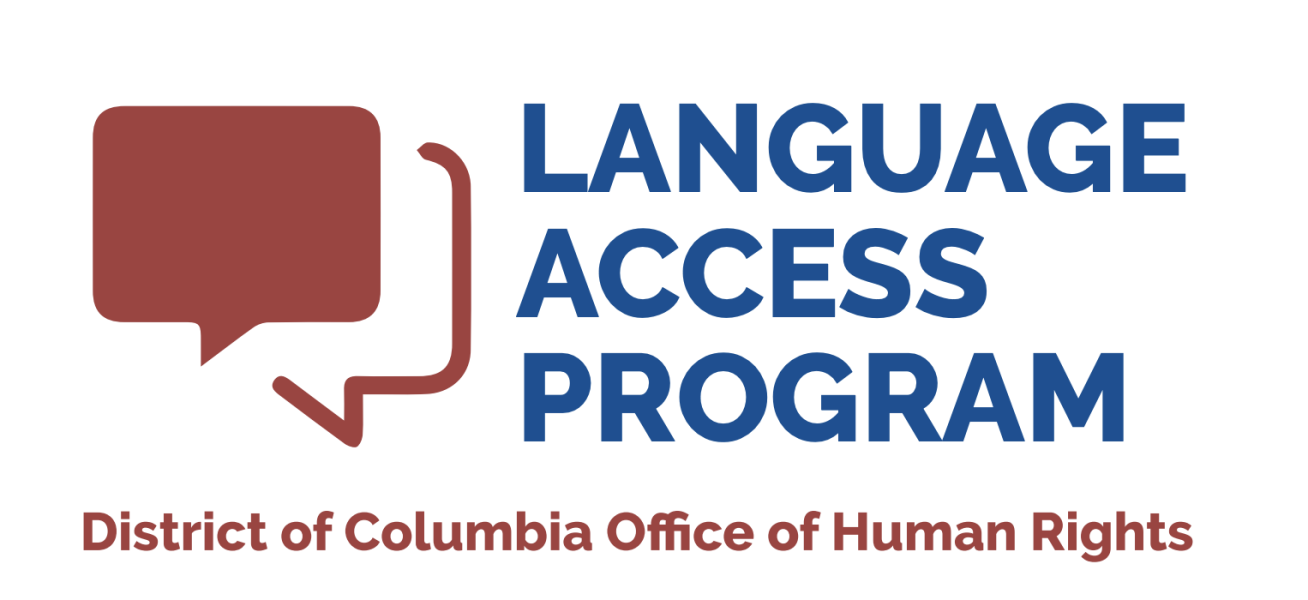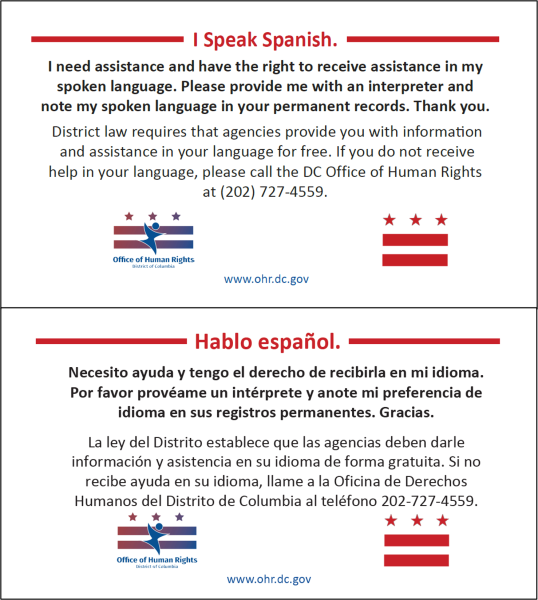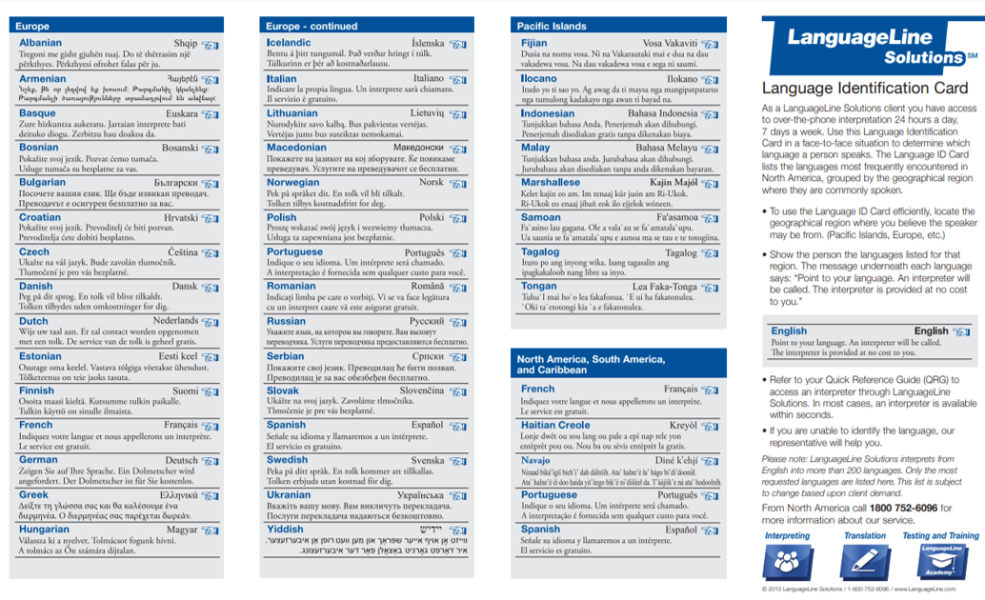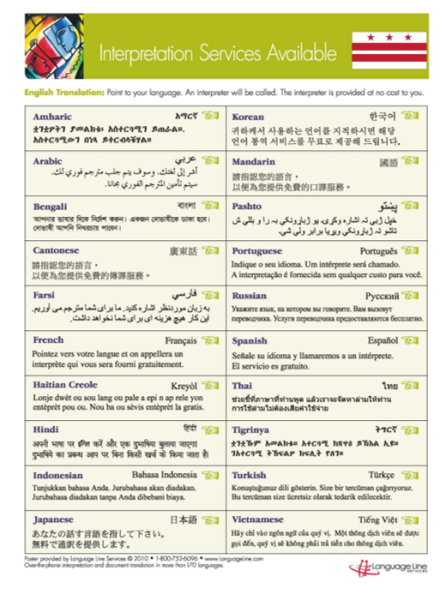
What is the Language Access Program?
No matter what language you speak, you have the right to receive information and services from the DC government. The Language Access Program works with District agencies to make this right a reality for residents, workers, and visitors who are limited or non-English proficient (LEP/NEP). Established by the Language Access Act of 2004, the Language Access Program is based out of the DC Office of Human Rights.
Why is language access important?
As the nation’s capital, the District of Columbia is a hub for immigration. The foreign-born population in the DMV is growing and diverse, representing countries from all around the world. Whether or not these individuals can speak English, they are part of our community and entitled to applicable government benefits and services. Removing the language barrier allows the District of Columbia to connect directly with a significant segment of its population, improving public health and safety for all.
To learn more about diversity in the District, see the Urban Institute’s report, Ten Years of Language Access in Washington, DC.
What are my rights under the Language Access Act?
The Language Access Act of 2004 applies to all District agencies, departments, programs, contractors, and grantees that interact with the public. It requires them to provide language access services to all constituents who need assistance when conducting official business in English. The District of Columbia recognizes these individuals as limited or non-English proficient (LEP/NEP). LEP/NEP persons have the right to the following language access services, free of charge:
- Translation
- Interpretation
- Signage
While the Act encompasses both spoken and written language, it does not extend to visual languages such as ASL.
Translation
The DC government is required to translate any written material that constituents need to learn about or apply for its services and programs. Depending on the agency involved, this material may include applications, notices, consent forms, and letters in both print and electronic form, in addition to other vital documents.
Interpretation
Interpretation is the official term for the process of converting what someone says out loud from one language to another. Although the public and media often use the term interchangeably with “translation,” the word “interpretation” refers to oral speech and “translation” refers to written texts.
Download our reference guide on types of interpretation (PDF).
Whenever LEP/NEP constituents interact with a DC government agency in person or over the phone, the agency must provide a professional interpreter who speaks their language. The interpreter may be a bilingual staff member, a professional in-person interpreter, or a professional telephonic interpreter. District employees offer interpretation at the start of an interaction, but LEP/NEP constituents may request an interpreter at any time.
Signage
The customer service locations of all DC agencies, departments, programs, contractors, and grantees should display signs informing LEP/NEP constituents of their right to interpretation and translated documents. Whenever you visit a District agency, you should be able to see signs such as the Language Identification Card or the Language Identification Desktop Poster, which include instructions in multiple languages for requesting language assistance.
Language ID Card
Download the Language ID Card (PDF)
Language ID Desktop Poster
Download the Language ID Desktop Poster (PDF)
How can I request language assistance?
District employees are trained to offer interpretation and translation to any customer who needs it, whether over the phone or in person. Before securing an interpreter, they may attempt to identify the customer’s primary language with questions, or by using the Language Identification Card or Desktop Poster.
over the phone or in person. Before securing an interpreter, they may attempt to identify the customer’s primary language with questions, or by using the Language Identification Card or Desktop Poster.
LEP/NEP customers may also self-identify by presenting District employees with an “I Speak” Card (updated on May 23, 2024). The DC Office of Human Rights distributes wallet-sized copies of these cards, which are available in Amharic, Arabic, Chinese, French, Korean, Portuguese, Russian, Spanish, Tagalog, and Vietnamese. You can also download your own copy here (PDF):
- እምናገረው አማርኛ ነው። (“I Speak… Amharic”)
- انا أتحدث اللغه العربية. (“I Speak… Arabic”)
- 我说的是汉语普通话。 (“I Speak… Chinese”)
- Je parle français. (“I Speak… French”)
- 저는 한국어를 사용합니다. (“I Speak… Korean”)
- Eu falo Português. (“I Speak… Portuguese”)
- Язык, на котором я говорю Русский. (“I Speak… Russian”)
- Hablo español. (“I Speak… Spanish”)
- Nagsasalita po ako ng Tagalog. (“I Speak… Tagalog”)
- Türkçe Konuşuyorum. ("I Speak... Turkish")
- Tôi nói tiếng Việt. (“I Speak… Vietnamese”)
Can I use my own interpreter?
LEP/NEP constituents are advised to use the professional interpreter provided by the District. Should they prefer to use a personal interpreter instead, LEP/NEP constituents must waive their rights in writing by signing a standard waiver form in their primary language. If a waiver form is not available in that language, then the District must use an interpreter to convey the contents of the form to the LEP/NEP constituent. Please note that all interpreters must be at least 18 years old.
What should I do if I experience or witness a violation of rights?
According to the Language Access Act of 2004, it is illegal for DC government agencies, departments, programs, contractors, and grantees to prevent LEP/NEP constituents from accessing services because of a language barrier. If you or someone you know is denied language access services, contact the DC Office of Human Rights by calling 202-727-4559 or by filling out the complaint forms. These are located below:
- Language Access Public Complaint Form (All Updated March 2025)
- English (Print) (Online)
- Amharic / አማርኛ (Print / የታተመ) (Online version / የመስመር ላይ ስሪት)
- Chinese / 中文 (Print / 打印版)(Online version / 在线版)
- French / Français (Print / imprimé) (Online version / version en ligne)
- Korean / 한국어 (Print /인쇄 버전) (Online version / 온라인 버전 )
- Spanish / Español (Print / impreso) (Online version / versión en línea)
- Vietnamese / Tiếng Việt (Print / bản in) (Online version / bản trực tuyến)
Complainants or advocates may mail or send this form to the following address:
District of Columbia Office of Human Rights
Attn: Language Access Program
441 4th Street, N.W., Suite 570 North
Washington, D.C. 20001
When a complaint is filed, the Language Access Program Director will attempt to ensure that the complainant receives the language assistance they are seeking before launching a full investigation.
Download the investigation process and timeline infographic (PDF).
Please note, while the Language Access Act encompasses both spoken and written language, it does not extend to visual languages such as American Sign Language (ASL) and all information regarding this can be found here.
Contact information
To learn more about the Language Access Program, contact the Office of Human Rights:
Email: [email protected]
Phone: 202-727-4559
To learn more about a specific agency’s language access services, you can reach out to the agency’s Language Access Coordinator (LAC) by clicking here to view and download the LAC Directory for FY25 (updated June 1, 2025) for major public contact.
This webpage was last updated on June 18, 2025




